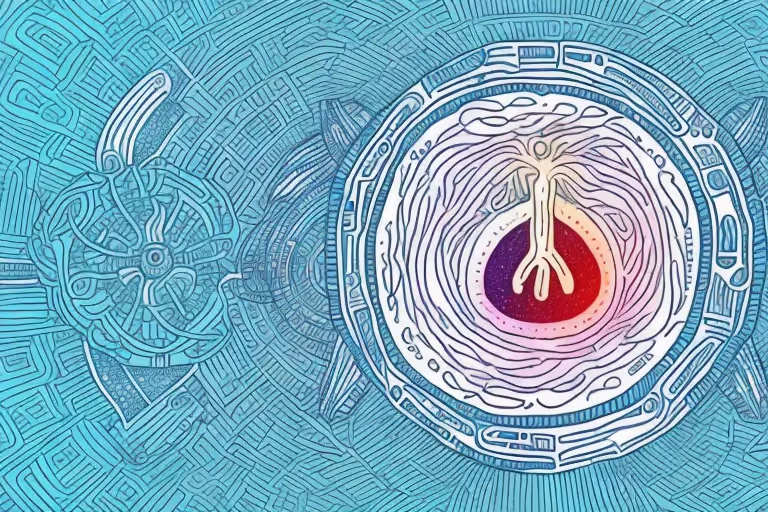Chest pain can be a frightening experience. It often triggers immediate concerns about our heart health and can leave us feeling overwhelmed with anxiety. But what if I told you that chest pain can also be a result of anxiety itself? Understanding the connection between anxiety and chest pain is crucial in managing our mental and physical well-being. In this article, we will unlock the mysteries of chest pain anxiety and discover effective ways to manage it.
What is Chest Pain Anxiety?
Before we delve into the topic, let's define what chest pain anxiety actually is. Chest pain anxiety, also known as cardiac anxiety or cardiophobia, is a condition where individuals experience persistent worry and fear about having a heart-related problem. These concerns often arise due to the presence of chest pain or discomfort.
Defining Chest Pain Anxiety
Chest pain anxiety is different from heart conditions such as heart attacks or angina. While heart-related issues are primarily physical, chest pain anxiety is rooted in psychological distress. It is characterized by excessive worry, fear, and preoccupation with one's heart health, which can lead to panic attacks and heightened anxiety symptoms.
Common Symptoms of Chest Pain Anxiety
When we experience chest pain anxiety, it is important to recognize the common symptoms. These symptoms may vary between individuals, but common indicators include chest tightness, shortness of breath, rapid heartbeat, sweating, dizziness, and a sense of impending doom.
It is crucial to remember that chest pain anxiety does not necessarily indicate a heart problem. However, these symptoms can still be distressing and affect our quality of life.
Let's delve deeper into the symptoms of chest pain anxiety to gain a better understanding. Chest tightness, one of the common symptoms, can feel like a constriction or pressure in the chest area. This sensation may cause discomfort and lead individuals to believe they are experiencing a heart attack. However, it is important to note that chest tightness can also be caused by muscle tension, stress, or even indigestion.
Shortness of breath is another symptom that often accompanies chest pain anxiety. Individuals may feel like they are unable to take a deep breath or that their breathing is shallow and rapid. This can further exacerbate feelings of anxiety and panic.
Rapid heartbeat, also known as palpitations, is a common physical response to anxiety. When experiencing chest pain anxiety, individuals may notice their heart beating faster than usual. This can be distressing and may lead to heightened anxiety symptoms.
Sweating is a natural response to anxiety and can be particularly pronounced during episodes of chest pain anxiety. The body's fight-or-flight response is activated, causing an increase in perspiration. This can be uncomfortable and may further contribute to feelings of distress.
Dizziness is another symptom that individuals with chest pain anxiety may experience. This can manifest as a feeling of lightheadedness, unsteadiness, or even a sensation of spinning. It is important to note that dizziness can have various causes, and it is not always indicative of a heart problem.
A sense of impending doom is a psychological symptom commonly associated with chest pain anxiety. Individuals may have an overwhelming feeling of fear or doom, as if something terrible is about to happen. This intense emotion can further fuel anxiety and make it difficult to cope with the symptoms.
While these symptoms can be distressing, it is important to remember that chest pain anxiety does not necessarily indicate a heart problem. Seeking professional help, such as therapy or counseling, can be beneficial in managing and overcoming chest pain anxiety.
Understanding the symptoms and their psychological origins is a crucial step in addressing chest pain anxiety. By recognizing that the symptoms are rooted in anxiety rather than a heart condition, individuals can work towards managing their fears and improving their overall well-being.
The Connection Between Anxiety and Chest Pain
Now that we understand what chest pain anxiety is, let's explore the deep connection between anxiety and chest pain.
The Role of Stress in Chest Pain Anxiety
Stress is a major contributor to the development and exacerbation of chest pain anxiety. When we experience stress, our body activates the "fight-or-flight" response, releasing stress hormones that can cause physical sensations such as chest pain. This can trigger a cycle of anxiety, where the fear of chest pain itself can lead to even more stress and anxiety.
By managing our stress levels and implementing effective coping strategies, we can break this cycle and regain control over our anxiety and chest pain.
How Anxiety Triggers Chest Pain
Anxiety can also directly trigger chest pain through mechanisms such as muscle tension and increased heart rate. During times of anxiety, our muscles may become tense, including those in our chest area, leading to pain or discomfort. Additionally, anxiety can cause our heart rate to increase, which can result in chest pain sensations.
Understanding that chest pain originating from anxiety does not pose an immediate threat to our heart health is crucial. However, it is essential to consult a healthcare professional to rule out any underlying medical conditions and alleviate any concerns.
Differentiating Between Chest Pain Anxiety and Heart Conditions
Distinguishing between chest pain anxiety and heart conditions is important to ensure appropriate medical attention and treatment. Let's explore the differences between the two.
Symptoms Comparison: Chest Pain Anxiety vs Heart Conditions
While chest pain anxiety can manifest with symptoms similar to heart conditions, there are some key differences to look out for. Chest pain anxiety symptoms are often fleeting, last for a shorter duration, and can be relieved by relaxation techniques or distraction.
On the other hand, heart-related chest pain is typically more consistent, may radiate to other areas of the body, and is not influenced by relaxation or distraction. Additionally, heart-related chest pain may be accompanied by other symptoms such as nausea, lightheadedness, or arm pain.
When to Seek Medical Attention
If you experience chest pain that is severe, prolonged, or accompanied by symptoms such as difficulty breathing, fainting, or a change in consciousness, it is crucial to seek immediate medical attention. It's always better to err on the side of caution and have a healthcare professional evaluate your symptoms.
Remember, seeking medical attention does not undermine your concerns or dismiss the impact of anxiety on your well-being. It simply ensures that any potential heart-related issues are appropriately addressed.
Coping Strategies for Chest Pain Anxiety
Now that we understand chest pain anxiety and its relationship with anxiety disorders, let's explore effective coping strategies to manage this condition.
Breathing Techniques for Anxiety Relief
One powerful tool in managing chest pain anxiety is deep breathing techniques. By taking slow, deep breaths, we can activate our body's relaxation response and reduce anxiety symptoms. Practice diaphragmatic breathing by inhaling deeply through your nose, filling your belly with air, and exhaling slowly through your mouth.
Incorporate deep breathing exercises into your daily routine, especially during moments of distress or chest pain anxiety. Remember, deep breathing not only calms the mind but also promotes physical relaxation.
Lifestyle Changes to Reduce Anxiety
Our lifestyle choices profoundly impact our mental well-being. Engaging in regular physical activity, maintaining a balanced diet, getting adequate sleep, and practicing stress management techniques like meditation or yoga can reduce anxiety levels and alleviate chest pain anxiety.
Furthermore, prioritizing self-care, engaging in hobbies we enjoy, and nurturing our relationships can promote a sense of well-being and resilience in times of stress.
Professional Treatments for Chest Pain Anxiety
While self-help strategies are beneficial, seeking professional treatment for chest pain anxiety can provide targeted support and resources. Let's explore some effective professional treatments.
Cognitive Behavioral Therapy (CBT) for Anxiety
Cognitive Behavioral Therapy (CBT) is a widely recognized and evidence-based treatment for anxiety disorders, including chest pain anxiety. CBT helps individuals identify and challenge their anxious thoughts and beliefs, develop healthy coping strategies, and gradually expose themselves to anxiety-provoking situations.
Engaging in CBT with a trained therapist can unlock the tools and strategies to manage chest pain anxiety effectively, improve your emotional well-being, and enhance overall quality of life.
Medications for Managing Chest Pain Anxiety
For some individuals, medication may be considered as part of a comprehensive treatment plan for chest pain anxiety. Antidepressant or anti-anxiety medications may be prescribed to help regulate neurotransmitters in the brain and alleviate anxiety symptoms.
It is essential to consult with a qualified healthcare professional who can assess your symptoms and determine the most appropriate medication, if necessary. Always follow their guidance and never self-medicate.
Understanding Chest Pain Anxiety and How to Manage It requires a multifaceted approach. By implementing coping strategies and seeking professional guidance, we can regain control over our anxiety and live a fulfilling life.
Before we conclude, let's take a moment to appreciate the benefits of the Aura Health App. Accessible at your fingertips, the Aura Health App offers a range of guided meditations, breathing exercises, and anxiety management techniques. Explore the app's features for personalized support on your journey towards conquering chest pain anxiety and nurturing your mental well-being. Together, we can unlock our full potential and live a life free from the confines of anxiety.
Aura is Your All In One App for Meditation, Mindfulness Wellbeing
Find peace every day with one app for your whole well-being. There is no one-size-fits-all solution to mental well-being. Aura is the first all-in-one wellness app that learns how to best help you. Discover an endless library of expert-created tracks for your well-being, all taught by the world’s best coaches, therapists, and storytellers. With Aura's personalized recommendations, you can find peace every morning, day and night.



.webp)






.avif)

%20(1).avif)


.avif)
.avif)
.webp)


.avif)


















































































































.avif)

















.svg)









